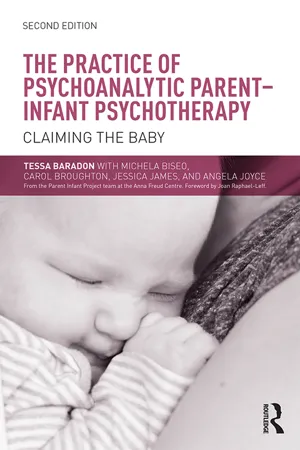
The Practice of Psychoanalytic Parent-Infant Psychotherapy
Claiming the Baby
- 214 pages
- English
- ePUB (mobile friendly)
- Available on iOS & Android
The Practice of Psychoanalytic Parent-Infant Psychotherapy
Claiming the Baby
About This Book
The Practice of Psychoanalytic Parent-Infant Psychotherapy is a comprehensive handbook, addressing the provision of therapeutic help for babies and their parents when their attachment relationship is troubled and a risk is posed to the baby's development. Drawing on clinical and research data from neuroscience, attachment and psychoanalysis, the book presents a clinical treatment approach that is up-to-date, flexible and sophisticated, whilst also being clear and easy to understand.
The first section: The theory of psychoanalytic parent infant psychotherapy – offers the reader a theoretical framework for understanding the emotional-interactional environment within which infant development takes place. The second section, The therapeutic process, invites the reader into the consulting room to participate in a detailed examination of the relational process in the clinical encounter. The third section, Clinical papers, provides case material to illustrate the unfolding of the therapeutic process.
This new edition draws on evidence from contemporary research, with new material on:
- Embodied communication between parent and infant and clinician-patient/s
-
- Fathers and fathering
-
- Engagement of at-risk populations
-
Written by a team of experienced clinicians, writers, teachers and researchers in the field of infant development and psychopathology, The Practice of Psychoanalytic Parent-Infant Psychotherapy will be an essential resource for all professionals working with children and their families, including child psychiatrists, psychoanalysts, psychotherapists, and clinical and developmental psychologists.
Frequently asked questions
Information
Index
Table of contents
- Cover Page
- Half Title page
- Title Page
- Copyright Page
- Contents
- Foreword
- Preface
- Contributors
- Acknowledgements
- Key Terms
- Section I The Theory of Psychoanalytic Parent–Infant Psychotherapy
- Chapter 1 The Parent–Infant Relationship and Infant Mental Health
- Chapter 2 The Theory of Psychoanalytic Parent–Infant Psychotherapy
- Chapter 3 The Clinical Framework and Participants
- Chapter 4 The therapist and therapeutic techniques
- Section II The Therapeutic Process
- Chapter 5 Parent–Infant Psychotherapy
- Chapter 6 The Middle Phase
- Chapter 7 Fathers
- Chapter 8 Consideration of Risk in the Parent–Infant Relationship
- Chapter 9 Endings in Parent–Infant Psychotherapy
- Chapter 10 Parent–Infant Psychotherapy in Groups
- Section III Clinical Papers
- Chapter 11 Finding Father Through the Regulating Function of the Parent–Infant Psychotherapist
- Chapter 12 Knowing and Being Known
- References
- Index